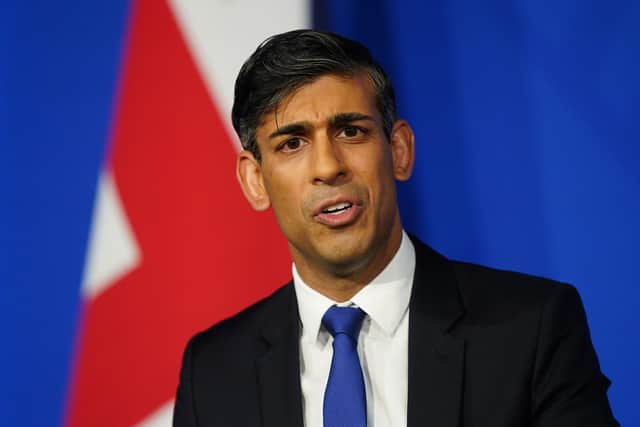Channel crossings drop by a third but remain second highest on record
Data showed that the last boat crossing in 2023 on 16 December saw 55 people come to the UK from France, brining the provisional total to 29,437 for the year.
This is 36 per cent lower than the record of 45,774 crossings for the whole of 2022 but it is still the second highest annual total on record.
Advertisement
Hide AdAdvertisement
Hide AdThe Home Office said that for the first time in five years, since records began in 2018, there were no Channel crossings on Christmas Eve, Christmas Day or Boxing Day.


The figures were yesterday championed by the Government as it heads into a crucial election year that could see a Labour Prime Minister in Downing Street for the first time in over a decade.
Immigration is set to be a key political battleground for the two main parties after Rishi Sunak promised to “stop the boats” in January last year, a pledge that he has now been accused of failing on.
Yvette Cooper, Labour’s shadow home secretary, said: “This has been the second highest number of small boat crossings on record, 100 times higher than it was five years ago - evidence of the failure of Rishi Sunak’s promise to stop the boats this year.
Advertisement
Hide AdAdvertisement
Hide AdThe Immigration Services Union, which represents border staff, said the drop in arrivals last year was likely to be a “glitch”, with “higher numbers” of Channel crossings expected in 2024.
Mr Sunak last month said that there was no “firm date” for meeting his pledge when questioned by MPs, in addition to a lack of clarity over when the Home Office is expected to clear the backlog of “legacy” asylum applications.
This month will see fresh attempts by the Government to push through asylum legislation aimed at getting flights running to Rwanda after the flagship scheme was hampered by legal challenges culminating in the Supreme Court deeming the policy unlawful.
Around 70,000 migrants have arrived in the UK since the deal was signed with Rwanda in 2022 by Priti Patel.
Advertisement
Hide AdAdvertisement
Hide AdLucy Moreton, professional officer for the Immigration Services Union, told BBC Radio 4’s Today programme: “The planning assumption for 2024 is that 2023 has been unusually low.
“There have been other confounding factors — we have had particularly high winds, we have had a larger number of days where it is less likely that we are going to get migrants in boats.
“But we have also had much larger boats, much more seaworthy boats, so the planning assumption is that this is a glitch.”
It comes as the Government’s immigration legislation came into force yesterday, meaning that international students are no longer allowed to obtain visas for their dependants.
Advertisement
Hide AdAdvertisement
Hide AdJames Cleverly, the Home Secretary, said that this will end the “unreasonable practice” of students bringing their family with them to the UK when they study.
He said that the ban will cut migration by tens of thousands, after official figures put net migration at over 670,000.
The move could hit universities which rely on foreign student fees and could also harm the UK’s reputation as an international destination, experts have warned.
Rishi Sunak said the announcement showed that the Government was “already delivering for the British people” in 2024.
Advertisement
Hide AdAdvertisement
Hide AdMr Cleverly said: “This Government is delivering on its commitment to the British public to cut migration. We have set out a tough plan to rapidly bring numbers down, control our borders and prevent people from manipulating our immigration system, which will come into force throughout this year.
“Today, a major part of that plan comes into effect, ending the unreasonable practice of overseas students bringing their family members to the UK. This will see migration falling rapidly by the tens of thousands and contribute to our overall strategy to prevent 300,000 people from coming to the UK.”